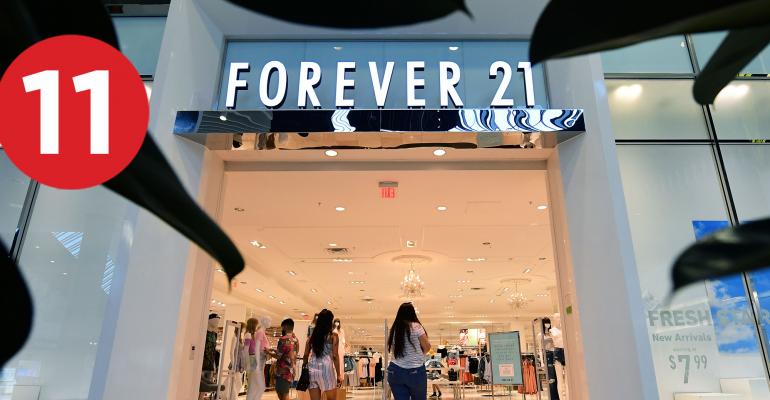- The Downtown Office District Was Already Vulnerable. Even Before COVID. “The modern downtown business districts of many large American cities were created through subtraction: First residents left the center city, then the craftsmen and wholesalers, then the museums, theaters and smaller retailers, and — the final blow — the department stores. What remained at the heart of many cities in the 20th century were blocks and blocks of office buildings filled perhaps 10 hours a day, five days a week — a precarious urban monoculture.” (The New York Times)
- Owner of Forever 21, JCPenney Files to Go Public “The owner of downtrodden retail brands including JCPenney and Forever 21 plans to sell shares to the public, according to documents filed with the Securities and Exchange Commission. Authentic Brands Group Inc. holds the license to more than 30 brands, including Sports Illustrated and Marilyn Monroe, as well as other well known retail names such as Brooks Brothers, Nine West and Eddie Bauer. The company gets most of its revenue from licensing fees.” (The Wall Street Journal)
- Oceanwide’s U.S. Business Is Sinking. Can It Right the Ship? “Oceanwide has been burdened by stalled megaprojects, lawsuits, a bond downgrading and capital controls that have tightened investment abroad.” (The Real Deal)
- ‘Someone Got Hosed’: A Pension System’s Real Estate Ambitions and the Deal That Drew the FBI “Why does a pension fund, ostensibly a public taxpayer-funded entity, use holding companies? For the same reasons private companies do: They help limit liabilities. If a lawsuit arises from one of these real estate investments, the fund’s larger assets (currently about $66 billion) would hypothetically be shielded from potential damages. They also lend greater flexibility in managing and possibly selling the properties down the line.” (Penn Live Patriot News)
- Lenders Work with Apartment Owners as Moratoriums Stretch On “The state and federal eviction moratoriums kept untold millions of people off the streets as the US economy struggled during the pandemic-led downturn. Many landlords were able to weather this disruption with little effect but others, especially smaller companies, are having to negotiate with lenders to stay afloat. Fortunately, as in other asset classes, lenders have been open to these talks, according to Bonnie Y. Hochman Rothell.” (GlobeSt.com)
- Ketchum, Idaho Has Plenty of Available Jobs, But Workers Can’t Afford Homes “Like many towns in the West with economies built around tourism, Ketchum is facing a cascading housing crisis caused by a rush of new residents during the Covid-19 pandemic, growing demand for workers during the economic boom that has followed, and a shortage of affordable homes that was years in the making. Businesses in this community of 2,700, located in central Idaho near the Sun Valley ski resort, are struggling to fill open positions, forcing some to cut hours. Some workers live in trailers or tents in the Sawtooth National Forest. And the waiting list for the 113 affordable-housing units for sale or rent in surrounding Blaine County is yearslong.” (The Wall Street Journal)
- Brookfield, Simon Invest in Sam Nazarian’s Food Court Ghost Kitchens Concept “Two of the largest mall owners in the U.S., Brookfield Asset Management and Simon Property Group, have invested in putting ghost kitchens in their food courts.” (Bisnow)
- Bloomingdale’s Is Getting Ready to Open its First-Ever Bloomie’s Store. Here’s a Look Inside. “Bloomie’s isn’t just a nickname anymore. The luxury department store chain Bloomingdale’s announced Wednesday that it will use the moniker for a new location, opening in Fairfax, Virginia, on Aug. 26. The word Bloomie’s has for decades been used as a term of endearment by fans of the original Bloomingdale’s.” (CNBC)
- Real Estate Platform Casafari Raises $15M to Allow PE to Buy Single-Family Homes at Scale “Casafari, a real estate data platform in Europe based out of Lisbon, Portugal, has raised a $15 million Series A funding round led by Prudence Holdings in New York. But, crucially, it has also secured a $120 million “mandate” from Geneva-based private equity investors Stoneweg, among other PE players, in order to buy-to-let residential and commercial real estate. The startup already has operations in Portugal, Spain, France, and Italy.” (TechCrunch)
- “The Cult of We” Review: the “Emperor’s New Clothes” of the Silicon Valley Age “Jamie Dimon, billionaire banker, adviser to presidents, leonine master of the financial universe, had FOMO. Mohammad bin Salman, the brash upstart who had come out on top in a ruthless Game of Thobes at the House of Saud, was eager to announce his primacy on the world stage. Masayoshi Son, whose early bet on Alibaba had made him one of the world’s wealthiest investors and a startup kingmaker, still had a Rodney Dangerfield-esque ‘I don’t get no respect’ complex.” (The Real Deal)
- 8 Ways Destiny USA Might Bounce Back: Can Laser Mazes, Musicals and Doctors Save a Struggling Mall? “Traditional retailers are likely to be hard to come by for the big Syracuse mall.” (Syracuse.com)
0 comments
Hide comments





